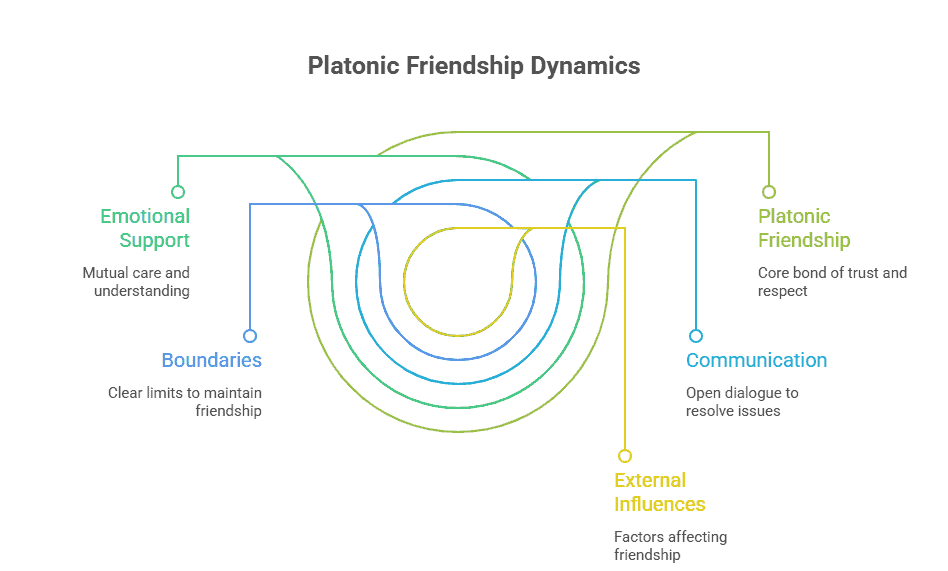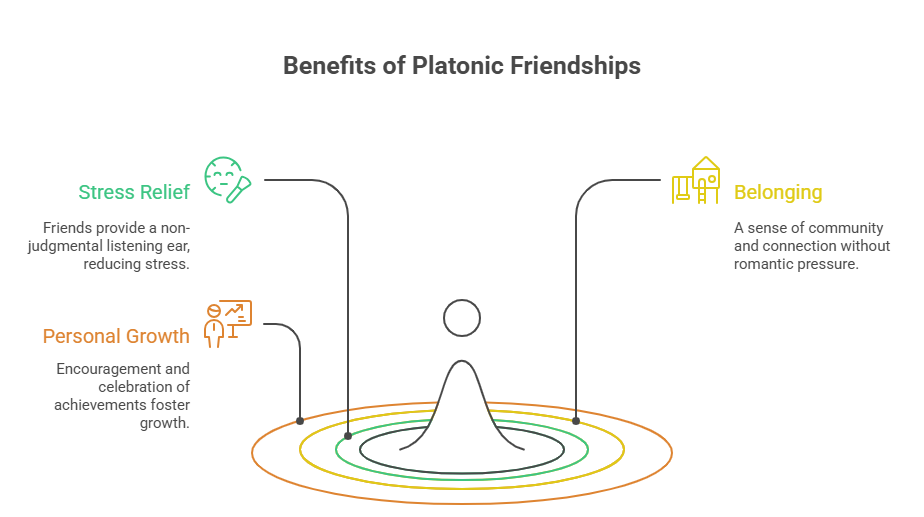If you have ever wondered what are platonic friendship actually means in the first place, a simplistic answer would be two people who share a close and meaningful friendship based on trust, respect, and emotional support, high on love or sexual attraction. These friendships may be fulfilling through mutual companionship and grounds that are firmly devoid of emotional arcs typical of an interpersonal relationship.
But then there are hard times for any given human connection, including platonic friendships. Sometimes there will be blurred boundaries or stretched-out feelings or an extremely good misunderstanding that gets nipped in the bud through good two-way communication, more involved, maybe a little therapy.

What are platonic friendships?
The word “platonic” had its origin from the name of the philosopher Plato, who spoke of the forms of love surpassing physical attraction. Thus, a platonic friendship is basically an emotionally intimate relationship that does not have any sort of romantic aspect to it.
Key Characteristics
- No romance or sex: This is the defining feature.
- Emotional closeness: Sharing thoughts, feelings, and life experiences openly.
- Mutual respect and trust: Being a safe place for each other.
- Shared interests: Enjoying activities together that strengthen the bond.
- Clear boundaries: Respecting limits so the friendship remains healthy.
How They Differ from Romantic Relationships
The implemented friendship is quite fortuitous because the bond involves the absence of romantic energy, flashy sessions, or the usual trek to the dinner table on a lovely winter afternoon for a nice chat with wine. It is more on the note of friendship, companionship, understanding, and mutual support.
Why Platonic Friendships Matter
Platonic friendships often provide the kind of stability and emotional nourishment that romantic relationships sometimes can’t.
Mental and Emotional Benefits
- Stress relief: Friends who listen without judgment can be better than any stress ball.
- Belonging: A sense of connection and community without the pressure of romance.
- Personal growth: Having someone encourage your goals and celebrate small victories.
Everyday Examples
- Lifelong same-gender friendships.
- Cross-gender friendships without romance.
- Mentor-student bonds rooted in trust and respect.
- “Chosen family” friendships that feel as strong as blood ties.

When Platonic Friendships Get Complicated
For all the goodness in platonic relationships, seemingly smooth friendships are often laden with bumps along the way. There are odd moments when romance inserts itself into friendship, when a need arises for one to look at the other in some other light, differences in perception, richness-wise, sometimes cast shadows on the friendship. Jealousy might even creep in, especially if one friend is in a romantic relationship while another, precious to the platonic one, feels left behind.
Another common challenge is poor communication: an absence of honest exchange gives rise to minor issues that grow into major conflicts. In some cases, an unhealthy dependency may evolve such that one leans too much on the other for emotional support, thus creating an imbalance and consequent tension in the friendship.
Possible Outcomes
Sometimes these issues lead to drifting apart. Other times, they spark conflict that ends the friendship. And occasionally—cue the rom-com soundtrack—they evolve into romance, though not always smoothly.
How to Keep Platonic Friendships Healthy
The good news is that most challenges in platonic friendships can be managed with effort and honesty.
Set Clear Boundaries
Talk openly about what feels comfortable. It may sound awkward, but boundaries protect the friendship from misunderstandings.
Communicate Honestly
If something feels off, don’t let it simmer. Addressing it early prevents resentment later.
Respect Romantic Partners
When one friend is in a partnership, respecting the dynamic is most important. Healthy platonic friendships must never compete with, or undermine, those commitments of a romantic nature.
Practice Empathy
Remember, your friend has their own needs and limitations. Support them, but avoid overstepping.
The Role of Therapy in Strengthening Friendships
Relationships are not something that comes with a handbook to give direction, but therapy can provide some direction and tools. For instance, it offers a shoulder to cry on for people to wrestle with the whirlwind of confusing emotions when the boundaries between friendship and romance become hazy; gives practical strategies to develop and maintain healthy boundaries; and helps process losses when people do not meet the expectations.
This specific therapeutic situation offers an opportunity to establish or develop the friendship further. Given that both parties agree, the therapy allows room for painfully honest conversations, rebuilding trust, and remaking the relationship on healthier, more balanced grounds.
What This Means for You
If you have ever wondered what platonic friendships really are, you will find them to be much more deeply valuable. Such relationships, built on healthy boundaries, honest communication, and sufficient empathy, can weather any storms and remain thrilling.
If situations arise that get complicated, such as when an innocent friendship causes strife in a marriage or partnership, professional intervention can lend assistance. At our Islamic couples therapy, we help couples examine the conflicts that friendships outside the relationship bring to trust and communication between them, as well as connection.
By employing faith-based tools and gentle dialogue, we assist couples in finding their way toward stronger relationships while remaining cognizant of how important platonic friendships can be within their lives.





